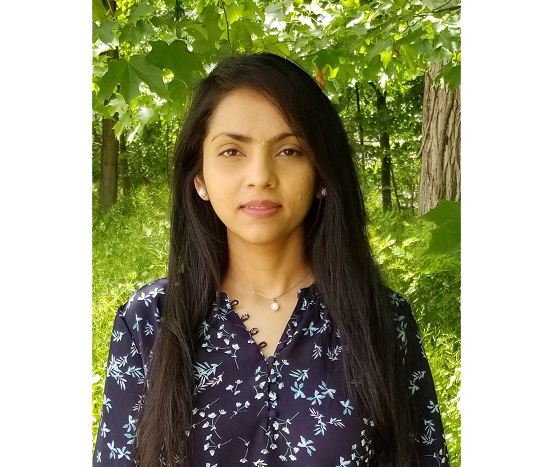Trainee Spotlight: Q&A with Divya Joshi
Divya Joshi is a postdoctoral fellow in the Department of Health Research Methods, Evidence, and Impact at McMaster University.
Can you tell us a little bit about yourself?
My name is Divya Joshi, and I am a postdoctoral fellow in the Department of Health Research Methods, Evidence, and Impact at McMaster University. I am from St. Catharines, Ontario and completed my undergraduate and master’s degrees at Brock University, and my PhD in Health Research Methodology (Clinical Epidemiology) from McMaster University. I am interested in research that aims to understand the impact of biopsychosocial resilience on physical and cognitive aging. My current research is focused on examining the pathways linking exposure to adverse childhood experiences and poor health outcomes including multimorbidity and physical functioning in the aging population. My dream job as a kid was to be a medical doctor but I started to develop an inclination towards population health research during my undergrad. Outside of work, I enjoy reading, poetry, vegan cooking, and hiking.
What interested you about the CLSA?
The CLSA’s design and methodology and the depth and breadth of data collection are what interested me about the CLSA. The longitudinal design and the comprehensiveness of the data including information on biological, psychological, socioeconomic, and lifestyle factors are essential to understand the impact of various exposures on changes in health outcomes and to elucidate the mechanisms that contribute to adverse health outcomes and successful adaptation as people age.
What type of research are you doing with CLSA data? Have you published? If so, what are the findings?
It is well established in the literature that exposure to adverse childhood experiences including childhood exposure to physical, sexual, and emotional abuse, neglect, intimate partner violence, and other household adversities have been shown to impact the health and wellbeing of people across their lifespan. Under the supervision of Dr. Parminder Raina and Dr. Andrea Gonzalez, my current research examines the underlying biological, social, psychological, and health behaviour pathways that aim to explain why people who have experienced traumatic and stressful events in childhood have higher risk of poor health outcomes including multimorbidity, poor physical functioning, and disability in later life.
We have recently published a paper in the CMAJ Open that reports on the prevalence of a wide range of adverse childhood experiences by sociodemographic factors in the middle and older age Canadian population. This is for the first time that we have obtained population estimates for many of the adverse childhood experiences including emotional abuse and neglect. Our results showed that about 62% of Canadian adults aged 45-85 reported experiencing at least one adverse childhood experience. More than 1 in 4 adults reported exposure to physical abuse, and 1 in 5 reported exposure to intimate partner violence and emotional abuse in childhood. We also found that people younger than 65 years, women, those having education attainment less than a bachelor’s degree, those with annual household income less than $20,000, and those of non-heterosexual orientation reported greater exposure to ACEs. These findings suggest that adverse childhood experiences are highly prevalent in the Canadian population, and that we should take measures to improve the quality of household environments, support positive parenting, and promote healthy child development as well as integrate trauma-informed care.
What is the most interesting or surprising thing you’ve learned from your work with the CLSA? How do you think the CLSA will help you grow as a trainee or in your future?
The most interesting thing I have learned from my work with the CLSA is that early life adversity not only have developmental impacts in childhood and adolescent years, but that it increases the risk of additional stressors, and impacts healthy aging trajectories by exerting a long-lasting impact on physical, psychological, and social health across the lifespan. Working with the CLSA will help me to expand my current understanding of methodologies and analytical techniques related to longitudinal studies and enable me to frame interdisciplinary longitudinal research questions on aging and health in the future.
How do you think the findings using CLSA data will be useful to you, or others, in the future?
With the demographic shift toward older age, it becomes particularly important to understand those factors that contribute to healthy aging. The findings using the CLSA data will help us better understand how biological, social, economic, psychological, and health and behavioural factors individually and together impact life transition and health trajectories. Findings from the CLSA will help educators, public health and clinical health care providers, and policy makers promote healthy aging, develop more effective prevention and treatment interventions, and improve quality of life of populations.
Do you have any idea about what kind of job you’d like to do when you finish school?
My postdoctoral work with the CLSA has inspired me to build a career focusing on the health of older adults. I would like to pursue a career in academia, working as a researcher and educator in an academic faculty position. I would like to build a program of research that is focused on understanding the impact of biopsychosocial resilience on cognitive and physical aging.
What is a non-career related thing that you are grateful for because of your work with the CLSA?
I am grateful for all the wonderful people I have met and worked with during the past couple of years and the friendships I have formed.
The CLSA is dedicated to establishing an innovative, interdisciplinary training environment for the ongoing engagement of new and emerging researchers, as well as maximizing the use of the CLSA platform as a rich resource of data for the next generation of researchers in health and aging.


